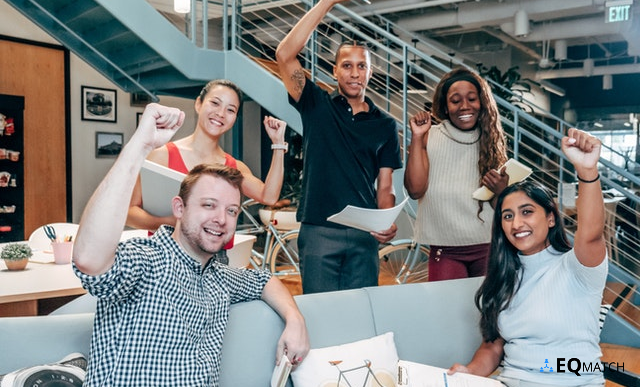Millennials represented 35% of the global workforce in 2020. Millennials represented 35% of the global workforce in 2020.
Millennials will make up 75% of the workforce by 2025.
Millennial turnover costs the U.S. economy $30.5 billion annually.
As per a Deloitte survey of millennials, a mere 48% believed that businesses behave ethically.
Understanding Millennials: Why does this matter now?
Given the growth of the millennials in the workplace, HR leaders are paying more attention to attracting and retaining Millennials in the workplace.
Moreover, as mentioned earlier, each year the US economy loses over $30.5 billion due to millennial turnover.
Gen Y makes about 25% of the world’s population.
As per psychologist Lynda Shaw, the younger generation, millennials included, have higher emotional intelligence in the workplace than previous generations.
A PEW research suggested that millennials were not only the happiest of employees; but also the educated generation.
Hence, leaders and HR professionals need to adopt new, innovative ways to guide and manage millennials effectively.
Emotional Intelligence Tests Can Help HR Managers Hire RIght

Understanding millennials: what they want in the workplace
Le’s first define millennials.
Millennials, or Gen Y, are those born between 1981 and 1996 (ages 23 to 38 in 2019).
Before launching a full-fledged strategy for attracting and retaining millennials, HR leaders need to pay attention to what Gen Y wants in the workplace.
Let’s cover some of the most important aspects.
Employee Wellbeing: The 5 Factors
Even before the Covid 9 pandemic, the top three generations had been focusing on businesses that focused on employee wellbeing.
Agreed, a large number of businesses have employee wellness programs.
But is that enough?
A complete wellness program should encompass career, social, financial, community, and physical wellbeing.
Employee wellbeing is one of the key areas of human resource management.
Ethical Leadership: People and Planet
Last year the Gen Y saw the SEC slap several businesses with fines’ not to forget the big scandals.
Ethical scandals are detrimental to organizational health and growth.
The millennials not only care about the “legal minimum’; albeit, they want to know if their organization’s work has a “net positive” impact on people and this planet.
The millennials also want their leaders to be both open and transparent.
Diversity, Equity, Inclusion (DEI)
Gen Y supports leaders and organizations that encourage (and implement) diversity, equity, and inclusion.
Human Resource Management professionals understand that DEI is no longer a “nice to have” factor; rather, it is a “must-have” to attract and retain the younger generation.
Glassdoor research shows that 76% of employees and job seekers said a diverse workforce was important when evaluating companies and job offers.
Diversity Equity and Inclusion in the Workplace with Emotional Intelligence
Environmental, Social, and Governance (ESG)
CSR (corporate social responsibility) has always been a key area of discussion among investors and executives.
After all, environmental, social and governance (ESG) measures have been shown to relate to financial growth and success.
The millennials want organizations that implement ESG measures.
Millennials Problems in the Workplace
High Turnover and Turnover Costs
As per a Gallup survey, 21% of millennials say they’ve changed jobs within the past year.
Millennials have a reputation for job-hopping.
Millennial turnover costs the U.S. economy $30.5 billion annually.
Lower Engagement
As per Gallup, only 29% of millennials are engaged at work.
The millennials are less engaged at work than all other generations.
Now that we talked about what millennials want in the workplace, and what are some unique challenges that businesses face, let’s address how business executives and HR leaders can attract and retain this generation.

Understanding Millennials: How to Attract and Retain Millennials?
Empower Employees
Gen Y wants to be part of their organization’s success.
Millennials can both reward or punish an organization depending on its commitment to social and environmental causes.
Create a Flexible Work Environment
This generation believes in a work-life balance, and rightfully so.
Gen Y is okay with giving up some of their pay and even reducing the pace of promotion in exchange for working fewer hours.
It is important to understand that millennials are committed to the success of their organization.
However, they prefer a more non-traditional route to achieve that success- a work environment that allows them to have a healthy work-life balance.
Businesses can offer remote working options while finding innovative ways to boost employee engagement.
Leverage Technology
Millennials have been one of the fastest adopters of technology.
Technology can improve flexibility and workforce efficiency.
Millennials expect to have access to the best tools for collaboration in the workplace.
Recognition & Rewards
This generation (millennials) want to enjoy their work and find meaning and purpose in their work.
They value recognition and appreciation.
Business leaders can encourage real-time appreciation, feedback, and development across the organization.
Focusing more on face-to-face coaching over filling out feedback forms can go a long way in boosting millennial engagement.
Community Building
Millennials want a strong cohesive, team-oriented culture at the workplace.
Gen Y put more emphasis on being part of cohesive teams over just high remuneration.
HR leaders can encourage this generation to connect, collaborate, and build their networks.
Millennials want to work at organizations whose corporate responsibility values match their own.
Support Diversity
The millennials don’t want to work with businesses that demonstrate a lack of a diverse workforce.
In a study from Deloitte and the Billie Jean King Leadership Initiative (BJKLI), millennials viewed diversity as the blending of different backgrounds, experiences, and perspectives within a team, aka, cognitive diversity.
Studies also suggest that 83% of millennials are actively engaged when they believe their organization fosters an inclusive culture.
Internal communications play an important role in aligning the entire workplace in achieving diversity.
Diversity Equity and Inclusion in the Workplace with Emotional Intelligence
Creating diversity-friendly policies, providing diversity training, establishing diverse mentorships, and building diverse teams are some of the actionable things HR leaders can contribute to fostering diversity in the workplace.
Advocacy Programs
42% of millennials use social media at work.
Businesses can find innovative ways to engage their employees on social media platforms.
Businesses trust people more than they trust brands.
After all, employees are considered the most trustworthy advocate of a brand.
Employee advocacy programs are cost-efficient, and they encourage employee involvement.
Given its positive impact on “human capital” (aka better recruitment, retention, and engagement), employee advocacy programs offer a win-win situation for both employers and employees.
Competitive Salaries, Career Growth
Underpaying your employees can increase employee dissatisfaction, hurt productivity, and contribute to turnover.
Businesses should highlight benefits like competitive salary, health insurance, professional development, job flexibility, remote work, and a human-centric organizational culture to attract and retain millennials.
87% of millennials emphasize “professional or career growth and development opportunities”.
Focusing on career growth opportunities can help businesses attract and retain millennials.
Emotional Intelligence Based Training and Development Programs
There are several reasons why emotional intelligence is important, especially in the workplace.
Emotional intelligence can help predict job performance.
Given that millennials are the largest generation in the workforce, and they are looking for flexibility, trust, and a sense of purpose at their workplace, HR leaders have the added responsibility of proactively and strategically attracting, engaging, and retaining millennial talents.
High EQ leaders can handle stress better and have better control over their moods and emotions.
Due to their high emotional intelligence, they are better equipped to understand the needs of their colleagues, motivate them, and reduce unnecessary stressors.
This is why businesses should invest in developing Emotional Intelligent leaders to truly engage and retain their millennial talent.
Emotional Intelligence Tests Can Help HR Managers Hire RIght
Conclusion
Millennials have much potential.
They want to participate in stimulating work with people they enjoy, while still having time to enjoy their lives.
As a demographic, Gen Y wants more than a job. This generation wants to challenge the status quo.
Understanding millennials, their needs and wants, can help HR leaders create a better work environment.
What are you doing in your organization to attract, engage and retain millennials?
Share your comments below.




No responses yet